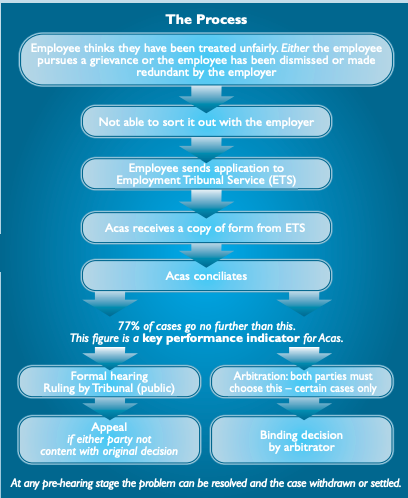
As markets become increasingly competitive it is essential that employers and employees have a good working relationship and are pulling in the same direction. The employment relationship can have a major effect on productivity and the success of a business.
It is just as important in the public sector where services are provided through the government – including health (hospitals etc) and education (schools etc). Increasingly all types of organisations refer to how they aim to treat their staff in descriptions of their overall ambitions. This helps them communicate respect for staff to people inside the organisation as well as to customers and potential employees. A reputation locally as a fair employer is very important in attracting and retaining good employees.
Recognising that a wholly independent, impartial third party can help the relationship between employers and employees, the government set up Acas in 1974 in the aftermath of a period of troubled labour relations. Over the last 30 years, Acas has built up an unparalleled reputation as an ‘honest broker’ and expert adviser. Acas’ ambition is to ‘improve organisations and working life through better employment relations’.
The organisation’s role is described by its full name Advisory, Conciliation and Arbitration Service (now rarely used). This also describes its statutory duties.
- Advisory – it advises on good practices in developing effective workplaces. Acas advisers help thousands of employers each year to improve communications and establish workplace practices that will help avoid conflict, and reduce the risk of a breakdown in working relationships.
- Conciliation – it finds common ground between employers and employees, helping each side to see the other’s point of view so they can solve a problem or resolve a dispute.
- Arbitration – independent arbitrators listen to both sides and put forward a solution that they will both either adopt (binding) or consider (non-binding) in a dispute.
- Service – the organisation works together with all parties, from a neutral position and seeks to provide the highest level of service itself.
Mediation is becoming the general term used to describe processes like conciliation and arbitration – alternative dispute resolution services. The aim is to resolve problems without a formal legal process such as a tribunal or court.
Most people associate Acas with large industrial disputes, eg the firefighters dispute in 2002/03, but as this Case Study shows, its role is much broader.
2. Activities
Acas is trusted by both employers and employees in workplaces. Many of its services depend on this. Acas’ activities are directed by a Council whose members reflect the views of employers, employees and independent interests. For example, there is usually a member from both the CBI (employers) and the TUC (trade unions).
Resolving large scale disputes
Although it is the area that most people associate with Acas, only 10% of its staff work on this. The number of such disputes has been relatively stable over the last five years (around 1500 a year at Acas). However there have been peaks in the number of days lost through industrial action due to a few large disputes involving tens of thousands of workers – such as the local government officers’ dispute in 2002.
In 2002/03 Acas played a major role in helping resolve the firefighters dispute. The trade union was seeking a higher pay settlement for modernising working practices. The employers were pressing forfurther changes in working practices and a lower pay settlement than the firefighters originally demanded. Acas helped them work towards a resolution by repairing relationships and looking for common ground.
Resolving disputes with individual employees
Nearly all applications to employment tribunals automatically go to Acas. Acas contacts both sides in the dispute (this may be via representatives such as solicitors or union officers) to see if the problem can be resolved through conciliation before reaching a tribunal hearing. In 2002/03 77% of cases were settled or withdrawn at this stage. This is the largest part of Acas’ workload involving around 40% of its staff. The number of cases has been declining slowly in recent years. Currently
there are around 95,000 cases a year.
But prevention is better than cure. Disputes can be costly especially in staff time, disruption to the business and the effect they can have on other employees. Tribunal hearings might also result in an award if the case is won by the employee. Acas, therefore, increasingly works to prevent employment issues turning into disputes in other words helping businesses get their employment relationship right.

Working towards effective workplaces
Acas works with organisations when relationships, procedures and processes could be better, are not running smoothly or are on the point of breaking down. This could be after a large scale dispute, when one is looming, when changes are being introduced or when an organisation wants to improve its employment relations. Acas works in partnership with both management and employees or employee representatives in an evenhanded way. Together they decide on the best way forward. Typically this might involve the Acas adviser facilitating a joint problem-solving workshop and helping to draw up new procedures. In 2002/03 senior advisers from Acas carried out 450 such projects. Often an important part of the solution lies in improving communication and consultation between management and employees. (See sections 5 and 6)
Training
Acas offers training to help employers introduce good practice and manage change. It will design courses specially for an organisation, sometimes one it has worked with (eg as described in Working towards effective workplaces above). This might cover how to work together effectively or how to deal with issues like bullying and harassment. Acas also offers standard sessions, specially designed for small businesses, which cover key points about employing people. SMEs with fewer than 50 employees often do not have a human resources (HR) management specialist. This lack of HR expertise is one reason why small businesses are involved in a higher proportion of complaints to tribunals than would be expected from employment statistics.
Advice and information
Acas’ work in this area is growing. Acas uses a number of ways to deliver the information people need to make important decisions and to give advice on what good practice looks like in day-to-day life at work or how to improve the employment relationship. These include:
◗ personal visits from Acas advisers
◗ website
◗ publications
◗ helpline (08457 47 47 47).
Acas’ helpline answers over 750,000 calls a year from employers, employees and representatives on all sorts of employment matters.
3. Acas’ role in disputes with individual employees
When an employee believes they have been unfairly treated by their employer and they cannot resolve the problem between them, the employee can take their complaint to an employment tribunal. Employees have around 100 rights now covering aspects of employment such as holiday, working time, maternity leave and pay, flexible working and contracts of employment. As outlined in Resolving disputes with individual employees overleaf, Acas has a duty to try to resolve the case before it goes to a tribunal hearing.
The largest category (or jurisdiction) of applications to tribunals is claims of unfair dismissal. In these cases the employer has taken disciplinary action over poor performance or misconduct leading to dismissal but the employee believes the employer acted unfairly. Acas has an additional role in these cases because tribunal panels use the Acas Code of Practice on Disciplinary and Grievance Procedures when deciding whether the dismissal has been handled in a reasonable way. In October 2004 new
legislation is due to come into effect requiring all organisations to follow minimum statutory discipline (where action is started by the employer) and grievance (where the employee starts the action) procedures. Tribunals will still need to refer to the Acas Code for reasonable behaviour guidance and the principles behind it.
Acas offers a choice in cases of unfair dismissal and where an employee believes their request to work flexibly (eg part time or during different hours) has not been dealt with properly. If both parties agree, they can opt for Acas arbitration the advantage over a tribunal hearing being that it is less legalistic and not in public.

Examples of Employment Tribunal Claims (2002-2003)

(Sources (i) Acas Annual Report 2002/2003; (ii) Employment Tribunal Service’s Annual Report)
4.Equality and diversity
The workforce and working patterns are changing. The working population is getting older and there are more women and men from different cultural and ethnic backgrounds. Employees rightly expect to be treated fairly and considerately. This expectation is generally supported by the law. It is illegal to discriminate against people at work on the grounds of:
◗ Gender
◗ Race
◗ Disability
◗ Sexual orientation (from December 2003)
◗ Religion or belief (from December 2003)
◗ Being or not being a member of a trade union.
From 2006 age will be added. Valuing the diversity of employees is also important from a business point of view. Companies with a diverse range of employees are better able to understand the needs of a diverse range of customers. They are also best placed to recruit and retain staff in an increasingly diverse and competitive labour market. These factors affect company performance.
The starting point is a good equality and diversity policy with an action plan to back it up. Acas has specialist advisers who give hands-on help putting these in place. It also works with the Equal Opportunities Commission to reduce the 18% pay gap between men and women which still exists more than 30 years after the introduction of the Equal Pay Act in 1970.
5. Effective workplaces
Acas believes that effective workplaces are determined by the right behaviour supported by policies and procedures. As part of its aim to improve workplaces, it has recently published a clear description of its view of an effective workplace. Acas works with organisations to take steps towards this.
◗ Staff and customers understand the business, its ambitions and its
plans for reaching them (its mission and strategy).
◗ Managers and employees communicate openly and everyone is
actively involved in making important decisions.
◗ People feel valued and can talk confidently about their work so they
can learn from successes and mistakes.
◗ Everyone is encouraged to improve their skills and knowledge both
for their current job and future career inside and outside the
business.

Employers encourage new ideas and people work together to
improve the organisation.
◗ Treating people fairly and valuing their differences is part of
everyday life.
◗ Employers provide a safe and healthy place to work.
◗ The pay and reward system is fair and consistent.
◗ People feel confident about discussing flexible working so that
personal needs fit in with the needs of the business.
◗ Management and employee representatives have good relationships
that in turn encourage people to trust each other throughout the
business.
◗ Managers and employees know about and properly use formal
procedures for dealing with disciplinary matters, grievances and
disputes.
6. Why are communication and consultation important?
A company’s performance is determined by that of its employees. They will be most effective if they know where they stand (eg their duties, obligations and rights) and feel involved in the company’s future by taking part in decisions and being well informed. This is particularly important when dealing with change. Communication and consultation are essential to an effective workplace (as described above)
◗ improve organisational performance – time spent communicating at the outset can avoid any misunderstanding later
◗ improve management performance and decision making – allowing employees to express their views can help managers arrive at sound decisions which can more readily be accepted by employees as a whole
◗ improve employees’ performance and commitment – employees will perform better if they are given regular, accurate information about their jobs.

Their commitment is also likely to be increased if they know what the organisation is trying to achieve and how they, as individuals, can influence decisions help develop greater trust.
◗ increase job satisfaction – employees are more likely to be motivated if they have a good understanding of their job and how it fits into the organisation as a whole
◗ encourage a more flexible working environment – promoting a good ‘work-life balance’.
These are two-way processes. Channels can include joint groups, team meetings, electronic, written, one-to-one, displays, etc. The information should be high quality and relevant. Processes need reviewing regularly to make sure they are working properly and involve everyone. An EU Directive on consultation comes into effect from 2005.
7. Conclusion
Good working relationships are vital for every organisation. The health of the UK economy is determined by the performance of all these organisations added together.
The government set up Acas to help employers and employees avoid disputes and resolve them where necessary. As an impartial organisation trusted by all sides, Acas encourages them to work closer together.
Acas helps organisations avoid disputes in the first place through informing, advising, training and working with individual businesses to create effective workplaces.
